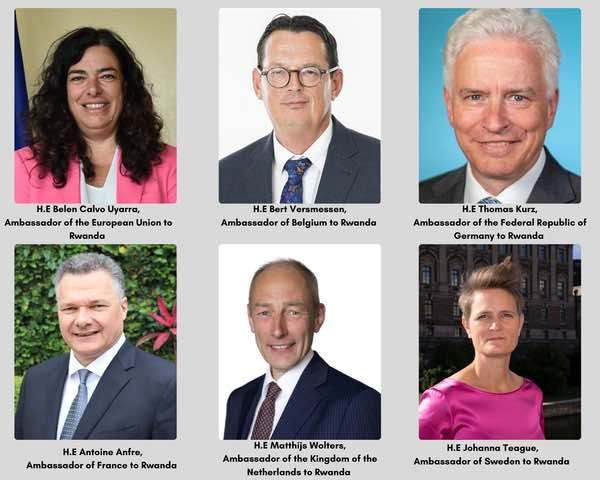
Today, Friday, 24 February, marks one year since Russia started its unprovoked and unjustified invasion of Ukraine, in blatant violation of international law including the UN Charter.
By 12 February 2023, the Office of the UN High Commissioner for Human Rights (OHCHR) recorded 18,955 civilian casualties in the country: 7,199 killed and 11,756 injured – 438 children lost their lives and 854 children were injured. Russia has waged a war with missiles and drones on Ukrainian critical infrastructure destroying power plants, electricity supplies and access to water, but also schools, hospitals and apartment buildings. Over 8 million Ukrainians have received shelter in the European Union, and over an additional 5 million more are internally displaced within Ukraine.
From the perspective of Rwanda, the war may seem far away, a European issue – and there are other more important issues to concentrate on. But: This war is a gross violation of fundamental values and principles of international law. This is a threat to all countries, because what is at stake is the territorial integrity, political independence and sovereignty of countries to make choices based on their own decisions. The UN Charter must be protected and upheld, as it protects all UN members against violations by third parties.
In addition, the crimes and atrocities committed in Ukraine cannot go unpunished. The international community must ensure accountability for the violations of international law and war crimes, in Ukraine as elsewhere.
Finally, Russia’s invasion of Ukraine is a threat to all countries, not just in Europe, for its broader economic impacts. Rwanda has suffered in the last year of energy and food price hikes; fertilizers have become more expensive making them almost unaffordable to small-scale farmers with negative effects on yields at the next harvest. Russia’s actions are putting the global community at risk, by causing food and energy insecurity, fuelling inflation and producing dramatic effects on the globe’s most vulnerable.
This shows that everyone is and should be concerned by the Russian war of aggression. All countries in the world should stand on the side of the United Nations charter, to uphold the international law, to reinvigorate the rules-based multilateral order, to defend the rule of law.
Six United Nations General Assembly resolutions confirm the international condemnation and isolation of Russia. The EU and its Member States remain united in supporting Ukraine, diplomatically and on the international stage. We act in unity with like-minded international partners, and we are taking decisive actions together, from sanctions to diplomatic isolation of President Putin and his regime, to our humanitarian, financial and military support for Ukraine.
The EU does not turn a blind eye to others, including in Africa, who suffer the consequences. The EU and its Member States are addressing crisis situations around the world and promoting comprehensive responses in support of people most in need. The food crisis was aggravated by Russia attacking Ukraine and blocking its food exports, but the EU is leading efforts to mitigate these negative consequences and is helping alleviate the global food crisis. The EU’s “Solidarity Lanes” initiative has so far enabled the export of 23 million tonnes of grain and other agricultural products from Ukraine through land routes to global markets. Together with the UN Black Sea Grain Initiative, these efforts have contributed to a drop in food prices over the last months. The EU has also delivered with a comprehensive Team Europe response to global food insecurity, adopted in June 2022. Rwanda has benefitted with a support of EUR 10 million (RWF 11.6 billion) to strengthen local food production and the resilience of food systems.
The EU and its Member States are also increasing its work in a humanitarian-development-peace nexus approach in fragile contexts and has considerably increased its humanitarian funding to the Greater Horn of Africa in 2022. We are also engaged with our partners in addressing the many crises that strike the African continent, in the Sahel and the Horn of Africa, or the Central African Republic. Our new Great Lakes strategy will provide the framework for new strategic EU engagement to promote peace, security, stability and development in this region.
Both Europe and Africa face serious threats to peace and security and we can only overcome the current security challenges together. Europe, Rwanda and Africa need to work together, as we do in northern Mozambique where the EU provides development assistance, training for the Mozambican armed forces, and funding to RDF and SAMIM operations in the fight against terrorism, to restore security and strengthen State presence and services for the civilian population.
Europe and Rwanda, Europe and Africa are partners. Only a few days before Russia launched its war on Ukraine, we set out the joint vision to consolidate and renew this partnership for solidarity, security, peace and prosperity for our citizens and for our future generations, promoting our common priorities, shared values, international law, and preserving together our interests and common public goods. The last year has demonstrated more than ever that Europe needs strong African partners in the global arena.(End).
Bert Versmessen, Ambassador of the Kingdom of Belgium
Dr Thomas Kurz, Ambassador of the Federal Republic of Germany
Antoine Anfré, Ambassador of France
Matthijs Wolters, Ambassador of the Kingdom of the Netherlands
Johanna Teague, Ambassador of Sweden
Belen Calvo Uyarra, Ambassador of the European Union
